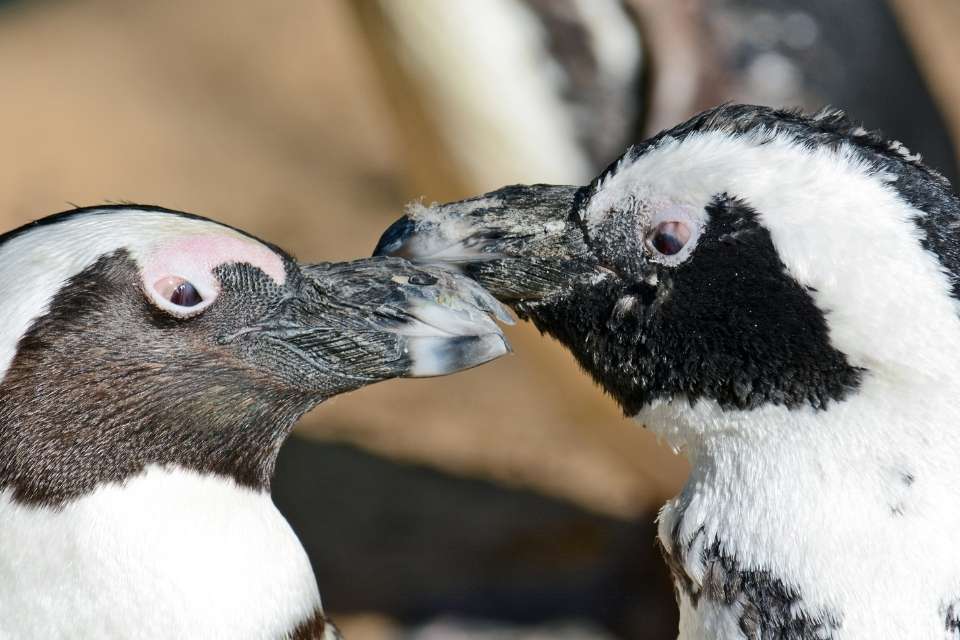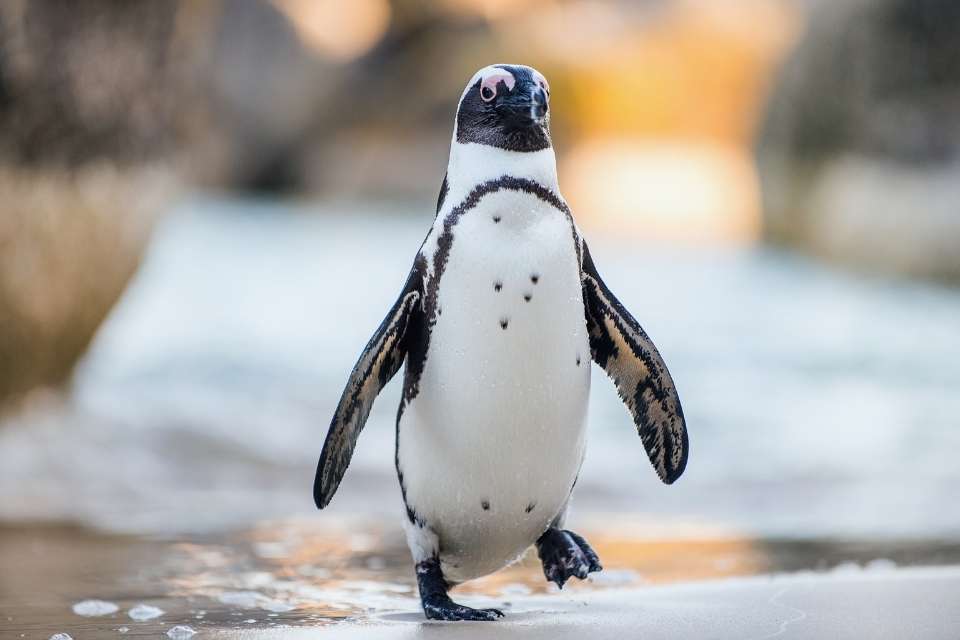When it comes to the vision of penguins, there is an interesting question that often arises: are penguins color blind? We are here to shed light on this topic and explore the fascinating visual system of these remarkable creatures.
Contrary to popular belief, penguins are not color blind. Their eyes have evolved to provide them with clear vision both on land and underwater. With a flattened cornea that refracts less underwater, penguins are able to see with true color vision.
Key Takeaways:
- Penguins are not color blind and have clear color vision.
- Their eyes are sensitive to violet, blue, and green wavelengths.
- Penguins have a flattened cornea that allows for clear vision underwater.
- They possess protective eyelids, including a third eyelid called the nictitating membrane.
- Penguins can recognize some colors and even reflect ultraviolet rays.
Penguin Eyesight on Land and Underwater
Penguins have remarkable eyesight that allows them to navigate both on land and underwater with precision. Their unique visual abilities make them excellent hunters and help them thrive in their diverse environments.
One of the key features of penguin eyesight is their binocular vision. This means that their eyes work together to create a single, 3D image.
It enables them to accurately judge distances and accurately capture their prey while swimming underwater. With their large eyeballs and shape-adjustable lens, penguins can spot their prey with clear color vision.
Depending on the species, penguins can recognize a range of colors. They can perceive hues such as reddish-brown, golden-brown, brown, red, bluish-grey, and yellow.
Their ability to differentiate colors plays an important role in their survival, helping them identify potential mates, recognize predators, and locate food sources.
When penguins dive into the water, their eyes undergo certain adaptations to ensure clear vision in this submerged environment.
Their cornea, the clear outer layer of the eye, becomes flattened, allowing them to see underwater with minimal distortion. However, the filtering of red light in water makes red and yellow lights less visible to penguins, while blue-green tones appear more prominent.
In the underwater world, penguins rely on their specialized eyesight to navigate and capture prey. Their color perception and visual adaptations are a testament to their exceptional visual capabilities.
Understanding the penguin’s perception of colors and their eyesight on land and underwater provides valuable insights into their behavior and survival strategies.
It allows us to appreciate the fascinating adaptations these remarkable creatures have developed to thrive in their diverse habitats.
Penguins’ Unique Vision Abilities
Penguins have unique vision abilities compared to other birds. They can see colors and are sensitive to a range of wavelengths, including violet, blue, and green. Penguins’ eyes are also capable of reflecting ultraviolet rays, which is used for mate selection.
Penguins spend a significant amount of time in the water, and they have adapted to see well in this environment. At depths of 3-5 meters, everything appears blue-green due to the filtering of red and yellow light. Penguins have bright eyelids that protect their eyes underwater and have a clear vision to catch fish.
They have an active muscle called the nictitating membrane or the third eyelid, which serves as protection.
In summary, penguins have remarkable vision capabilities that allow them to perceive colors and see clearly underwater. Their ability to reflect ultraviolet rays and adapt to the marine environment contributes to their survival and ability to locate food.
These visual adaptations make penguins fascinating creatures with a unique perspective on the world around them.
Other Senses in Penguins
When it comes to the senses of penguins, their hearing, taste, and smell play important roles in their lives.
While penguin hearing has not been extensively studied, it is believed to be good, although not as acute as that of marine mammals. Penguins rely on their auditory senses to communicate with each other and locate their mates and colonies.
Penguins also have marvelous color vision, being able to perceive a range of colors.
They are particularly sensitive to violet, blue, and green wavelengths of light, which aids them in their marine environment. Some species of penguins may even have the ability to see ultraviolet light, which may assist them in various aspects of their lives.
Regarding taste, penguins have poorly developed taste buds, similar to other birds. However, the sense of smell in penguins may be more developed than initially believed. Research on certain penguin species suggests that they can detect prey-related scents and use their sense of smell to distinguish between related and unrelated individuals.
Notable Senses of Penguins:
- Good hearing although not as acute as marine mammals
- Color vision, being sensitive to violet, blue, and green
- Possibly the ability to see ultraviolet light
- Poorly developed sense of taste, similar to other birds
- Possible heightened sense of smell, aiding them in scent discrimination
“Studies on some penguin species indicate that they can smell prey-related odors and use their sense of smell to discriminate related and non-related individuals.”
Understanding the various senses of penguins sheds light on how they navigate their environment, communicate, and interact with other members of their species. These sensory adaptations are crucial for their survival and help us appreciate the fascinating world of these extraordinary creatures.
Conclusion
Penguins, fascinating creatures of the Southern Hemisphere, possess remarkable color vision that sets them apart from other birds. Contrary to popular belief, penguins are not color blind.
They have the ability to recognize a range of colors, including violet, blue, and green. Whether on land or underwater, penguins navigate their surroundings with clear vision, thanks to their unique visual adaptations.
Their eyes, equipped with a flattened cornea, allow them to see with clarity both above and below the water’s surface. Penguins rely heavily on their sight to secure their next meal, effortlessly spotting prey amidst the vast ocean.
Their visual prowess is further enhanced by their large eyeballs and shape-adjustable lens, enabling them to perceive colors such as reddish-brown, golden-brown, brown, red, bluish-grey, and yellow, depending on their species.
Penguins’ distinctive vision does not stop at color perception. They have evolved to reflect ultraviolet rays, a feature used in important aspects of their lives, including mate selection.
Additionally, penguins possess impressive external eye protection in the form of bright eyelids and a nictitating membrane, commonly known as the third eyelid. These adaptations safeguard their eyes underwater, ensuring they maintain a clear line of sight while hunting for fish.
While further exploration is needed, penguins also have other sensory abilities that aid their survival.
It is believed that their sense of hearing is acute, allowing them to detect sounds in their aquatic environment. Additionally, recent studies suggest that penguins possess a heightened sense of smell, enabling them to discern prey-related odors and differentiate between kin and non-kin.
Exploring the unique color vision and visual adaptations of penguins adds to our understanding of these remarkable creatures’ perspective on the world.
Through their exceptional eyesight and sensory abilities, penguins have conquered the challenges of their environment, solidifying their place as remarkable inhabitants of the Southern Hemisphere.
FAQ
Are penguins color blind?
No, penguins are not color blind. They have clear vision both on land and underwater.
What colors can penguins see?
Penguins can recognize colors such as reddish-brown, golden-brown, brown, red, bluish-grey, and yellow, depending on the species.
Do penguins see colors in the water?
Yes, penguins have adapted to the underwater world by having a flattened cornea that provides clear vision underwater. Their eyes are sensitive to blue-green tones, while red and yellow lights may appear less visible due to the filtering of red light in water.
Do penguins have protective eyelids?
Yes, penguins have protective eyelids, including a third eyelid called the nictitating membrane, which helps them see underwater and protects their eyes.
Can penguins reflect ultraviolet rays?
Some penguin species, like emperor and king penguins, can reflect ultraviolet rays, which is used for mate selection.
What other senses do penguins have?
Penguins have good hearing, although not as acute as marine mammals. They also have a sense of smell, which they use to discriminate related and non-related individuals.
How does penguins’ vision contribute to their survival?
Penguins rely on their vision to catch prey underwater and navigate their environment. Clear vision both on land and underwater is essential for their survival.


